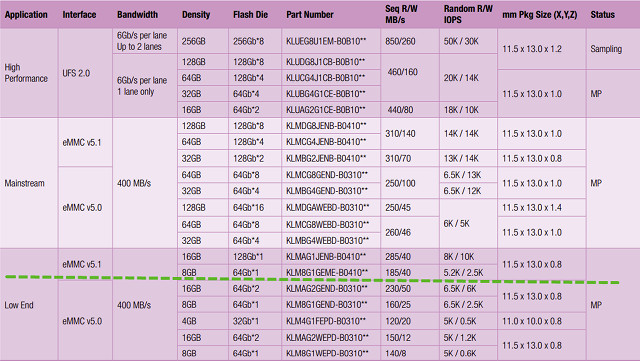Samsung does not always keep up its website up-to-date when it comes to its embedded flash chips, and performance metrics such as sequential read/write and random read/write values are not shown for all devices. The former is mostly important for data storage, while the latter may make a big difference for the operating systems responsiveness, and applications that rely on many short write and/or read operations. A table with the latest Samsung eMMC 5.0/5.1 and UFS 2.0 chips, and performance metrics somehow dropped in my computer.

The company offers low end eMMC 5.0/5.1 flash with capacities between 4 and 16 GB with performance up to 285/40 R/W MB/s and 8K/10K R/W IOPS, mainstream chips between 32 and 128 GB delivery up to 310/140 MB/s and 14K IOPS, and all UFS 2.0 device are faster than any of the eMMC flash (limited in theory to 400 MB/s) with capacity between 16GB and 256GB, sequential read/write speed up to 850/260 MB/s, and 50K/30K IOPS. KLUEG8U1EM-B0B10 UFS 2.0 flash performance is quite impressive as sequential read speed is about equivalent, if not faster, than many 256 GB SATA III SSD drives, but sequential write speed, looks a little slower. IOPS values could also mean fast booting times (less than 10 seconds?), and excellent overall system responsiveness.

Jean-Luc started CNX Software in 2010 as a part-time endeavor, before quitting his job as a software engineering manager, and starting to write daily news, and reviews full time later in 2011.
Support CNX Software! Donate via cryptocurrencies, become a Patron on Patreon, or purchase goods on Amazon or Aliexpress





Are there any Android based STB’s available on the market with UFS 2.0 chips?
@Tat
I think not, since there aren’t any STB SoCs with UFS 2.0 that I’m aware of.